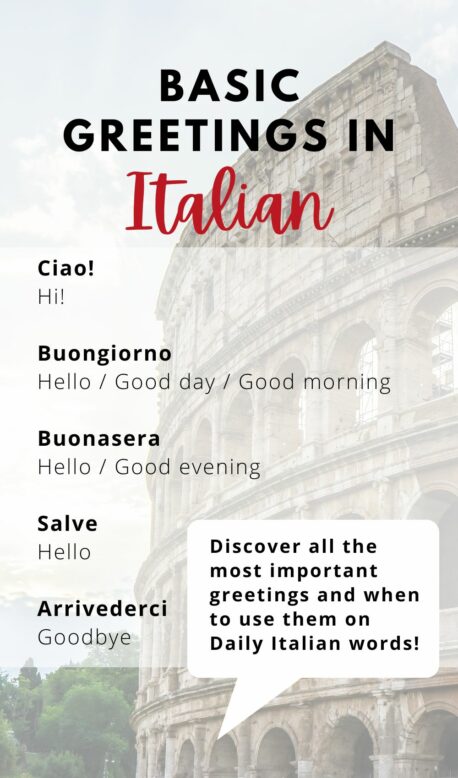In this article, you’ll find a practical guide to the use of the most important and common Italian greetings. It is indeed good to know when certain greetings may not be appropriate, or precise enough, even if they sound very familiar. Although certain greetings have crossed borders and are known all over the world, they can still hide some little secrets. Let’s discover them now!

Ciao
Ciao is by far the most used and widely known basic Italian greeting. It derives from an ancient good mannered expression in the Venetian language: s’ciao vostro, literally your slave, but is understood as at your service.
Thanks to the popularity gained over the past two centuries, ciao is now a spontaneous and informal greeting. A peculiar feature of this word is that it is used both when you meet someone and when you part. This often arouses the curiosity of many non-Italian speakers, but there’s no need to worry, the double use of ciao never leads to confusion in real life. Moreover, when you meet a friend you usually say things like: Ciao, come stai? (Ciao, how are you?) and when you leave: Ciao, ci vediamo! (Ciao, see you later!)

Buongiorno / Buonasera
If you ever have any doubts about how to greet someone in Italian, know that you can always rely on these two common greetings. They are suitable for almost any occasion when you meet someone, as well as at the beginning of any form of spoken or written conversation.
Buongiorno (literally “good day”) can be used from the early morning until the early hours of the afternoon. In fact, there is no precise rule for when you can switch from buongiorno to buonasera (literally “good evening”). Older people tend to use buonasera immediately after 12 p.m., but in modern Italian this seems odd. Personally, I would recommend saying buonasera when you feel the daylight is starting to wane.
More specific greetings like buon mattino, literally good morning and buon pomeriggio, good afternoon, exist, but they are not really used. You might hear them on TV shows that are aired at those times of day.
An interesting fact related to the spelling of these two common greetings is that they can be written both as one word or as two separate words: buongiorno / buon giorno, buonasera / buona sera. However, the one-word version tends to be more frequent.

Buondì (or buon dì)
This is a more colloquial variation of buongiorno. The word dì is synonymous with giorno, besides sounding a lot like day. Interestingly, though, dì and day do not share the same origin: the former derives from the Latin dies, while the latter is from the Old English dæg.
Salve
Salve is a popular form of greeting that comes directly from the Latin verb salvēre meaning to be in good health. It became a greeting in the form of a wish like good health to you / may you be in good health, but this literal sense has been lost in modern Italian.
The peculiarity of salve is that the older generations consider it informal while the younger ones consider it pretty formal. To avoid mistakes, I would recommend using it in semi-informal contexts. If, on the one hand, it is rare to use it with people with whom you are very familiar, on the other it could be inappropriate if addressed to a professor, a doctor or other professional figures.
Salve is mostly used when you meet someone, but it is also used by some when leave-taking, a bit like ciao.

Buona giornata / buona serata
Buona giornata and buona serata follow the rules of buongiorno and buonasera, but they are used when leaving rather than when meeting someone because they express a wish for a good rest of the day or evening. (See the article on our blog about the difference between giorno / giornata).
Arrivederci
Arrivederci is a relatively formal Italian greeting used when parting ways with someone we expect to meet again in the future. If we look at it closely, we can see that it is composed of ‘a – ri – veder – ci’, literally to see us again (as in ‘until we meet again’). It has a more formal variant, arrivederLa, which you can use with a person you address with the formal pronoun Lei.
In addition to this, there is a “telephone” variant a risentirci, which is consistent with the fact that the two interlocutors have not actually seen each other, but have only heard each other’s voices.

Ci vediamo
This greeting is like arrivederci but much more friendly and informal, and it translates as the English see you later.
Ci sentiamo
This is a greeting that expresses the desire to stay in touch, even if only by text. Unlike a risentirci, it is also commonly said after meeting in person, and it corresponds to the English talk to you soon.
Addio
If we take a close look at this common Italian greeting we can clearly see the words a Dio, meaning to God. You may be somewhat familiar with the French expression adieu or the Spanish adiós, but unlike these in Italian addio is a very strong and expresses a definite goodbye. It is so strange and unusual to hear in everyday life that it is somewhat bound to the world of films, theatre plays, and novels.
In real life, we might hear people saying addio at funerals, or at the end of a love affair. It can also be uttered in a sarcastic tone, and used in situations that are somehow paradoxical, as is often the case with words that are loaded with emotional intensity. Se andiamo a mangiare dalla nonna, ADDIO dieta! / If we go to eat at grandma’s, ADDIO diet!
Bella
Almost everyone knows that this word means beautiful, but probably outside of Italy it is not known that for some years bella has also been used instead of ciao by the younger generation. This is especially true for very informal ways of speaking by the young generation in large metropolitan areas such as Rome and Milan, an. Bella probably comes from older expressions like bella ragazzi! which underlines the positivity of a certain situation, more or less like good job guys! in English.

With these expressions, you should have no trouble greeting someone in Italian in a variety of situations, from informal conversations to much more formal interactions.
To conclude, here are some colloquial parting expressions starting with “a”. This preposition can sometimes be included in a word, as in arrivederci and addio, or be separate, as in a risentirci. Its function is to express a lapse of time to be filled, more or less like until or to.
A più tardi / a dopo = see you later (literally: to/until later/ to afterwards)
A presto = see you soon (literally: to soon)
A domani = see you tomorrow
Alla prossima = literally: to the/until next time

Written by Nicco Curini, certified teacher of Italian since 2016, working online since 2019.
Website: ditelab.blogspot.com | Social media: Instagram – Facebook – Twitter

Niccolò Curini has been teaching Italian since February 2016, primarily at the Language Center of the University of Goettingen in Germany. In this role, he led courses ranging from level A1 to B2. To qualify for this position, he obtained the DITALS certification, enabling him to teach Italian as a Foreign Language to university students. Social media: Instagram – Facebook – Twitter


